Rightwing BJP seems in a hurry to force its agenda for the new government. Apart from seeking citizenship rights for the West Pakistan refugees, the party wants a fresh delimitation to undo the “injustice” with Jammu in the number of assembly seats. Is BJP’s aiming at reengineering basics of population and politics in J&K to suit its historic loud-thinking on Kashmir and is it the reason for delay in government formation, explores R S Gull
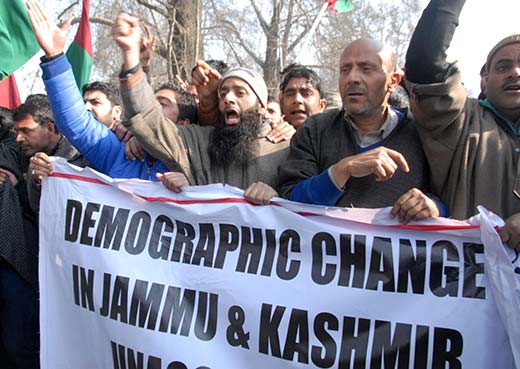
Pic: Bilal Bahadur
Mood in the Fairview Guest House, Kashmir’s new power centre on the Gupkar power street, was upswing after the emissaries flew back from the famous 90 – minute meeting. It was, however, short-lived. On January 5, came the report that Prime Minister Narendra Modi is keen to get state subject rights to the West Pakistan Refugees (WPR). A day later, it was followed by another report suggesting that a 31 -member Joint Parliamentary Committee (JPC) has strongly recommended, among other things, granting of permanent citizenship rights to the WPRs.
Given the right wing party’s antiquated ideas of changing the demography of J&K, it was supposed to generate a lot of heat and dust.
Condemnations apart, everybody in Kashmir, cutting across party lines reacted sharply.
NCs Ali Mohammad Sagar said the “wicked conspiracy” was aimed at changing state demography and the special status. Various JPCs have made various recommendations including the revocation of the AFSPA, he argued, but this time implementing a JPC recommendation is becoming hurry for the government. “We can smell a rat in these recommendations,” he said. “It’s highly unfortunate that some regional parties are part and parcel of these conspiracies, the example of which is PDP which brought the Women’s Rights Bill in the legislative assembly to weaken the state constitution.”
“The Hurriyat unequivocally and vehemently opposes the recommendation made by the Indian Parliamentary Standing Committee on Home Affairs to grant Permanent Resident status to refugees from erstwhile West Pakistan,” Mirwaiz Umer Farooq told an extended meeting of the alliance. “We caution the Government of India and the BJP leadership from proceeding ahead with any step to violate, dilute or undermine the legal rights of the permanent residents, state subjects of J&K.”
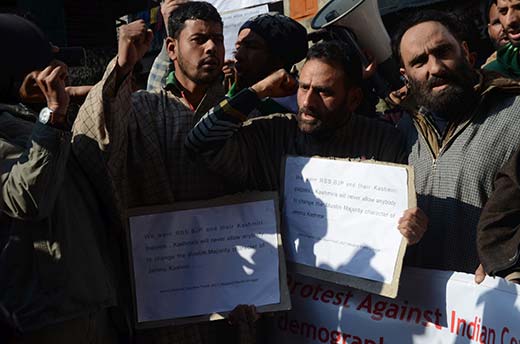
Pic: Bilal Bahadur
Proposing the formulation of “a united, effective and sustained effort”, the cleric asked unionist parties to resist the move, if they believe in J&K’s “demographic integrity”.
All others followed. It added to the pressures on Greens. They understand the costs of acceding to BJP demand in the backdrop that Kashmir is averse to any effort impacting J&K’s demographic composition. J&K has a harsh state subject system in place since Maharaja Hari Singh ruled the state. Though state’s demography has undergone various upheavals in past, it still retains its Muslim majority state status. Muslim population in J&K fell by 8.21% from 72.4% in 1941 to 64.19% in 1981. It was only in 2001 that Muslim population exhibited some growth reaching 66.97%.
PDP cannot consider this demand because it is already accused of making a major compromise in early 2003, when Mufti Sayeed literally surrendered to the Congress threats and helped a crucial bill die a painful death.
The latest JPC was set up in September 2014, when Kashmir was fighting history’s worst flood. Interestingly, there was not even a single member from J&K in JPC. Even BJP’s recently elected two MP were excluded from the JPC. BJP asked its small rung officials in the state to keep quiet on the issue but the issues is still live and, behind the doors, the party is seeking some forward movement!
A senior PDP leader and lawmaker said their possible ally is “Kashmir illiterate” and the ongoing courtship will help it understand the niceties of managing Kashmir. This party, he said, has remained talking about Kashmir behind closed doors for most of its history! “This is the first time, they will understand what Kashmir is all about,” he said. “They should not have raked-up the unfinished issues of the partition.” But they did it.
The question of WPRs of 1947 is being singled out as a humanitarian issue, side-stepping other major issues, also linked to the demography. During partition of J&K, the erstwhile state witnessed a series of demographic upheavals. The first major and perhaps the worst were the Jammu massacres that completely changed the demographic composition of the city. More than six decades later, there are only estimates as the events were obliterated from the history.
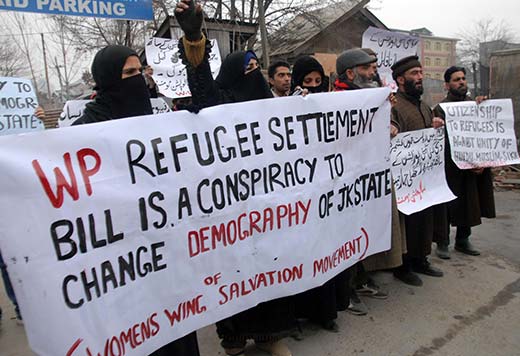
Pic: Bilal Bahadur
Second major crisis was the mass migration. There were three types of migrations taking place between various parts of the erstwhile J&K. Thousands of people fled to Pakistani side from Kashmir and the subsequent regimes continued pushing back “enemy agents” till the 1965 war was over.
Tens of thousands of people, mostly Hindus fled from Mirpur and Muzaffarabad after the areas fell off from the Hari Singh regime. Some of them were killed as well. Passing through Kashmir, Jammu was the main destination of all these migrants.
Official records suggest 31619 Hindu families were uprooted from various J&K territories (now forming PaK) in 1947-48 and migrated to Jammu. Of them, 5300 families settled in other parts of India as 26319 settled within J&K. They are displaced persons (DP) and state subjects.
Post-migration, the government allotted them more than a million kanals of land including 700 thousand kanals which fleeing Muslims had left behind in Jammu. Apart from plots, cash assistance was also extended to them. In fact, Rs 55.17 crore grant plan is still being implemented among 2841 families who never got any cash assistance and another 48 families who had not got any residential plot are getting their share from a separate Rs 4 crore MHA grant.
With them were many other families from areas falling under West Pakistan, mostly Sialkot. They are not state subjects and are formally designated as refugees – the WPRs. Their numbers have slightly undergone a shift over the decades.
The then Revenue Minister M N Koul informed the state assembly on March 16, 1971 that only 2752 WPR families are in J&K. Dr Karan Singh,the then Sadr-e-Reyasat told The Statesman on March 25, 1981 that there were around 3000 families from Sialkot and 90% of them were Harijans. On August 30, 2007, the government told the Panthers Party founder Bhim Singh in the state legislative council that J&K has 4745 WPR families comprising 21979 souls.
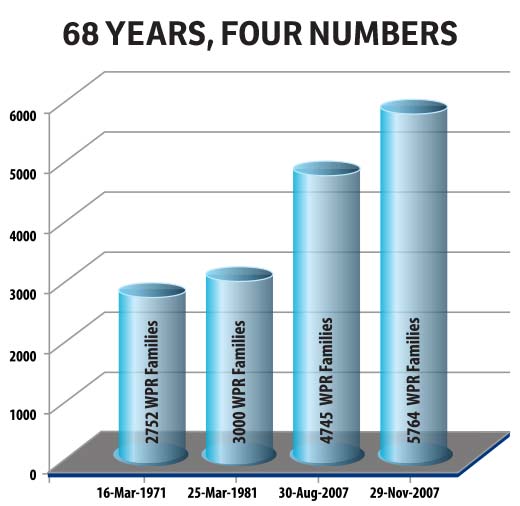 But the numbers had a completely different spin after a committee led by IAS officer G D Wadhwa, the then Financial Commissioner, submitted his report on November 29, 2007. He put the WPRs number at 5764 families comprising 47215 souls who are scattered across Jammu, Kathua and Rajouri districts. Under Cabinet Order (No 578-c of 1954), the Committee said the WPRs were given right to use over 46466 kanals of land on basis of either 12 acres of Khushki or 8 acres of Aabi per family. No government has ever considered them for any social or political rights and never ever considered them for granting state subject rights. They lack voting rights in the state assembly unlike Lok Sabha.
But the numbers had a completely different spin after a committee led by IAS officer G D Wadhwa, the then Financial Commissioner, submitted his report on November 29, 2007. He put the WPRs number at 5764 families comprising 47215 souls who are scattered across Jammu, Kathua and Rajouri districts. Under Cabinet Order (No 578-c of 1954), the Committee said the WPRs were given right to use over 46466 kanals of land on basis of either 12 acres of Khushki or 8 acres of Aabi per family. No government has ever considered them for any social or political rights and never ever considered them for granting state subject rights. They lack voting rights in the state assembly unlike Lok Sabha.
“At that time, we were 5,764 families. Today, we have grown to 25,460 families, not more than one hundred fifty thousand people. We have been living here for over six decades now but we don’t have any rights. We are not citizens here. The future of our children will also be ruined like ours,” Labha Ram Gandhi, 53 said. Labha Ram is the president of the association of refugees from West Pakistan.
Both DPs and WPRs are a major vote bank making Congress and BJP to take up their issues, throughout. Congress forced Omar Abdullah to seek Rs 9096 crore package from the centre for rehabilitation of both DPs, Chammb refugees and WPRs and the cabinet cleared it on October 16, 2014. Once the ball was in the centre’s court, the follow up was natural. Since then MHA is writing frequent letters to the state administration for extending one or the other facility to them and even asking considering them for bestowing state subject rights. The last letter that Home Secretary Anil Goswami, a J&K cadre IAS officer from Jammu, wrote to state government was on November 7, 2014.
So when JPC was reconstituted in September, it recommended a Rs 30 lakh compensation to each of the DP and WPR families, besides, reservation in the twin houses of the state legislature. Home Minister Rajnath Singh was quick in follow up. While he directed Chiefs of all Central Armed Police Forces (CAPFs) that WPRs be considered for recruitment, J&K government was urged to issue them domicile certificates.
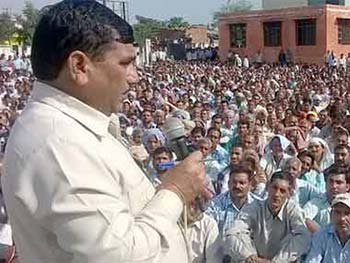
J&K Resettlement Act is one of the most famous pieces of law that remained a controversy and has reminded Kashmir of its disempowerment. It seeks resettlement of persons who were valid state subjects before May 14, 1954, and had migrated after March 1, 1947 “to the territory now included in Pakistan”.
Passed by state’s twin houses in April 1982, the then governor B K Nehru refused assent and instead raised objections. While President Giani Zail Singh made a Presidential Reference to the Supreme Court (under Article 142(1)) in September 1982, state legislature managed its passage on October 4, 1982, forcing the governor to give his assent on October 6, 1982.
The law could not be implemented as it remained buried in the courtroom for one or the other reason. Mrs Indira Gandhi actually won the 1983 election in Jammu (almost on the 2014-BJP pattern on this issue).
The last major development on this law took place on November 8, 2001, when a five-member bench (Chief Justice S P Barocha, Mr Justice Syed Shah Qadri, Mr Justice N Santosh Hegde, Mr Justice S N Variava and MrJustice Shivraj V Patil) returned the reference without any response.
“…it appears to us inexpedient to answer the question posed to us in the (presidential) reference”, the bench observed. “Under the provisions of Article 143, this court may respectfully decline to express its advisory opinion, if it is satisfied that it is not appropriate to do so, having regard to the nature of the questions forwarded to it and having regard to other relevant facts and circumstances… Having regard to the facts that the bill became an Act as far back as in 1982, it appears to us inexpedient to answer the question posed to us in the Reference. Even if we were to answer the question in the affirmative, we would be unable to strike down the Action this proceeding. We think, therefore, that the reference must be, respectfully, returned un-answered.”
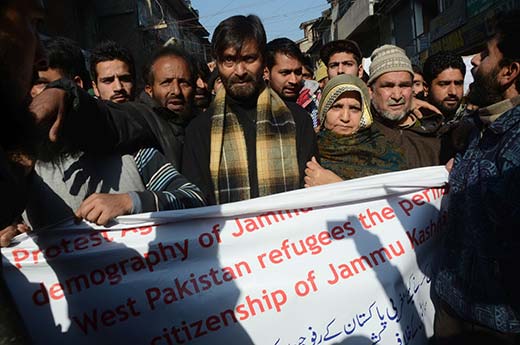
Pic: Bilal Bahadur
This was the follow-up to a writ petition by a civilian that was dismissed in 1999 after the petitioner died. But the 2001 verdict sent the NC government talk of creating an “authority” for implementing the law.
But soon followed another petition. This time by Panthers Party chief Bhim Singh, who sought a stay on its implementation. The last argument in the case was that if the bill is struck down, it can trigger internal disturbances in the state and if it is upheld it can compromise the state’s integrity. The law that could open the gate for more than a quarter million people from Pakistan and the rest of the world is still in the court.
While sudden flare up on the WPRs was just not a coincidence. It was not the only idea that Modi led BJP government spewed on J&K at its most crucial juncture. Apart from suggesting granting of a permanent resident certificate to the DPs not living in J&K, the JPC even recommended that one-third of the 24 berths (eight seats) in assembly kept symbolically for PaK, be de-freezed for DPs and WPRs. For this, the JPC recommended an amendment in the constitution.
In its on-going negotiations for the government formation, however, BJP is assertive on one point; to start fresh de-limitation for the state assembly. After the last delimitation that increased assembly strength from 76 to 87, in April 1995, the future delimitation was frozen till 2026. Jammu and Kashmir Representation of the People Act 1957 and Section 47(3) of the Constitution of J & K were amended in 2002.
Later, when Bhim Singh went to the Supreme Court to challenge that, the case was dismissed in November 2010.
But Jammu based parties, earlier Congress and now BJP, keen to wrest power in Srinagar, want to bulldoze everything to increase seats of Jammu. Of 87 seats, 46 are in Kashmir, 37 in Jammu and 4 in Ladakh. Kashmir is more populous than Jammu and Ladakh. Last time when the issue raked up, Ghulam Nabi Azad led government summoned an all party conference and suggested a proportional approach. Even bills were readied but it did not take off.
The disproportionate delimitation, people who are aware of the happenings said, is not aimed at any demographic shift. “You have 1000 seats in the assembly but you cannot change the basic characteristics of the state demography which is Muslim majority,” said an academic.
“But you change numbers in the regions and sub-regions to actually dis-empower the ethnic Kashmiris, which apparently seems to be the purpose.”
Ironically while the state is under governor’s rule, Dr Jitendra Singh Rana, an MoS in PMO, decides that people living on the borders be relocated. He seeks assurance from the district administration in Kathua that within two months it will arrange 3100 kanals of land so that 5000 families living on border are relocated on free five marla’s of land.
Jammu’s divisional Commissioner Shantmanu told reporters that the state wanted to relocate nearly 6000 families from 300 villages living between 0 to 5 Kms from the IB or the LoC, in five of the eight districts. Relocating populations from the border areas at a time when there is no state government in place indicates the urgency with which BJP in Delhi is working on Kashmir. It is interesting to mention that people in Kashmir, Poonch and Rajouri have repeatedly rejected the idea of relocation from the places they live in, especially after 1965 and 1971 wars.
Such actions would always be suspect because the Parivaar has throughout talked about a sort of ethnic flooding which suits its political philosophy in J&K. In May 1993, for instance the visiting Israeli leader Shimon Peres’ interaction with BJP leader L K Advani triggered a major controversy because Peres was reported to have suggested changing the demographic character of the state. Later Home Minister S B Chawan had to reassure that it is not happening.
“The BJPs protestations are harder to accept if only because extremist elements of the Parivar have long fancied demographic change or more accurately, a change which would result in a Hindu majority in Kashmir, to be the most effective and durable solution to the problems plaguing the state,” Times of India wrote in an editorial on June 2, 1993. “The dangerous character of this policy hardly needs reiteration; it is purely and simply another expression of a communal mindset…”
It remains unchanged even in 2014. Subramanian Swamy said in November 2014 that one way of securing the return of Kashmiri Pandits is to settle a million strong ex-servicemen in Kashmir for creating “circumstances conducive” to their return. What makes the entire debate interesting is that while BJP is piloting it, Congress is firmly not supportive of it on ground.
















Any discussion on demographic change in Kashmir cannot be complete without mentioning the fact that several lakh Kashmiri Hindus have been driven away from their homes during the violent uprising of 1990. Until they return to their homes in Kashmir and start living inKashmir with safety, dignity, zand pride, all arguments in favour of protecting the current demographic status quo would be considered very weak.